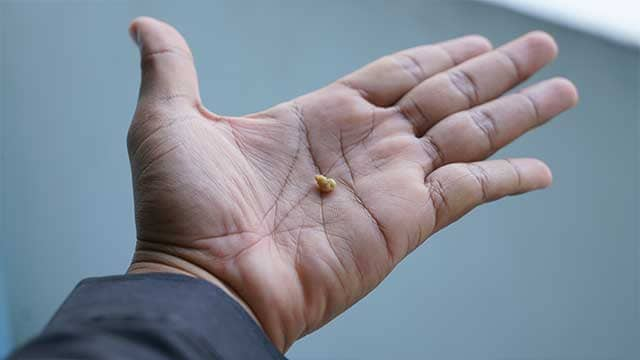-
-

ADULT ORTHODONTICS
Should You Use Mouthwash Before or After Brushing?Brushing and flossing are the foundation of a good oral hygiene routine, but mouthwash can also be a useful addition...

SELECTING DENTAL PRODUCTS
Soft Vs. Hard Toothbrush: Which One Should You Use?The toothbrush has come a long way. As the American Dental Association (ADA) notes...
-
Science & Innovation
- Oral Health and Dental Care | Colgate®
- Oral Health
- Tongue Cancer


Say the word "cancer" and most people think of the most well-known conditions: lung, colon, skin and the like. Although oral cancer – specifically that of the tongue – tends to be an afterthought, the tongue plays a crucial role to eating and speaking. It's therefore just as important to know what to look for in tongue cancer symptoms so your oral health doesn't threaten these basic functions.
What is tongue cancer
The tongue is divided into two parts. The front two thirds is the oral tongue, whereas the back third is the tongue base. Tongue cancer is one type of oral cancer that, according to Cancer Treatment Centers of America (CTCA) , forms on the oral tongue. This cancer usually originates in thin, flat cells known as squamous cells, which fully cover the tongue's surface. Any cancer that develops on the tongue base is known as an oropharyngeal cancer.
Tongue cancer symptoms
If you suspect you might have tongue cancer, consulting your dentist is the first step. He or she will want to perform a thorough oral examination. Before making that call, keep an eye out for these symptoms, which, as described by CTCA , can indicate the presence of an oral cancer:
- Chronic sore throat.
- Pain when chewing or swallowing.
- Chronic jaw or tongue pain.
- A red or white blemish anywhere in the mouth, especially on the tongue, that won't go away.
- Chronic mouth numbness.
- Trouble moving the tongue or jaw.
Detecting tongue cancer
Having noticed one or more symptoms indicating tongue cancer, it's time to call your dentist. The first step your dentist will take is to perform a basic oral examination. The Oral Cancer Foundation suggests numerous areas are involved in a proper diagnosis, but the tongue, throat, cheeks, roof and floor of the mouth and neck lymph nodes should all receive a thorough examination. If the doctor does discover an unexplained growth in the oral cavity, he will ultimately provide a brush or tissue biopsy.
Other detection methods should be performed by a doctor as necessary. An endoscopy, for example, can be used to get a closer look down your throat and into your lungs. X-rays of the jaws, chest and lungs will show if the cancer has spread from the tongue, whereas a CT scan will reveal any potentially malignant tumors. Like an X-ray, an MRI is helpful in determining if the cancer has indeed undergone metastasis, infecting another part of the body. If your doctor can't determine the cause of your symptoms, he may refer you to an ear, nose and throat specialist.
Treatment methods
The key to treating any form of cancer is finding it early, before it spreads. Tongue cancer, in particular, has several treatment approaches depending on the infection's size and whether or not it has traveled to the neck's lymph nodes. Small, isolated tumors are removed surgically. Cancer that has spread to these lymph nodes should receive the same treatment, so long as it is followed by radiation therapy sessions to destroy any remaining cells. Of course, chemotherapy is another treatment option you may choose to explore with your primary doctor.
Any form of cancer should be considered a life-threatening condition, and therefore deserves the best medical attention to ensure your course of treatment is ideal for you. Nevertheless, the best way to avoid these tongue cancer symptoms is to live the healthiest life possible. For tongue cancer, this includes maintaining an oral health routine that doesn't just avoid tobacco products, but keeps your teeth and tongue healthy by brushing daily.
Related Articles

If you notice anything strange in your mouth, such as a gum boil or a bump that looks like a pimple, it's a good idea to have it checked out by a dentist.

Tonsil stones, clinically called tonsilloliths, are small, white discharges that form in the crevices of the tonsils. They are typically found on the surfaces of the pharyngeal tonsils on either side at the back of the throat. They can be as small as a grain of rice or as large as a pea. They are quite common and usually harmless, but they may spark alarm in patients when noticed for the first time.

Related Products

Helping dental professionals
More professionals across the world trust Colgate. Find resources, products, and information to give your patients a healthier future








